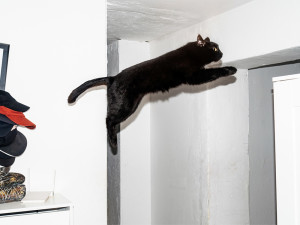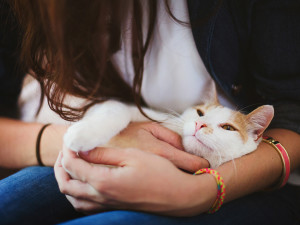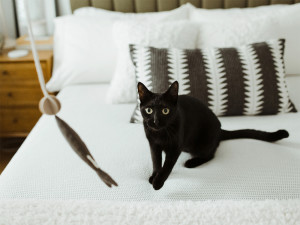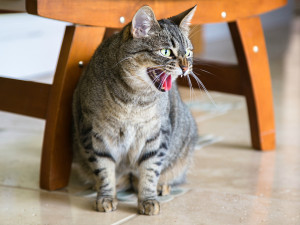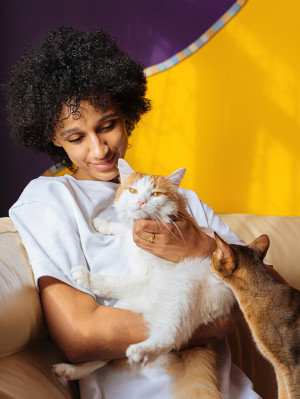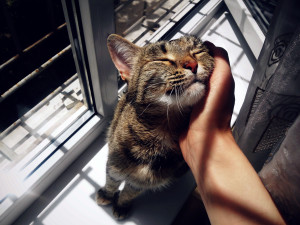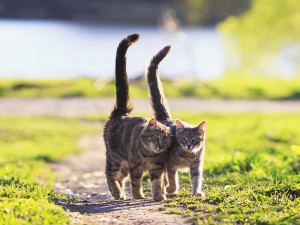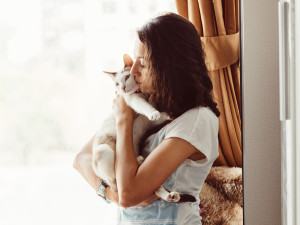Why Does My Cat Bite Me?
Don’t live in fear of your feline overlord.
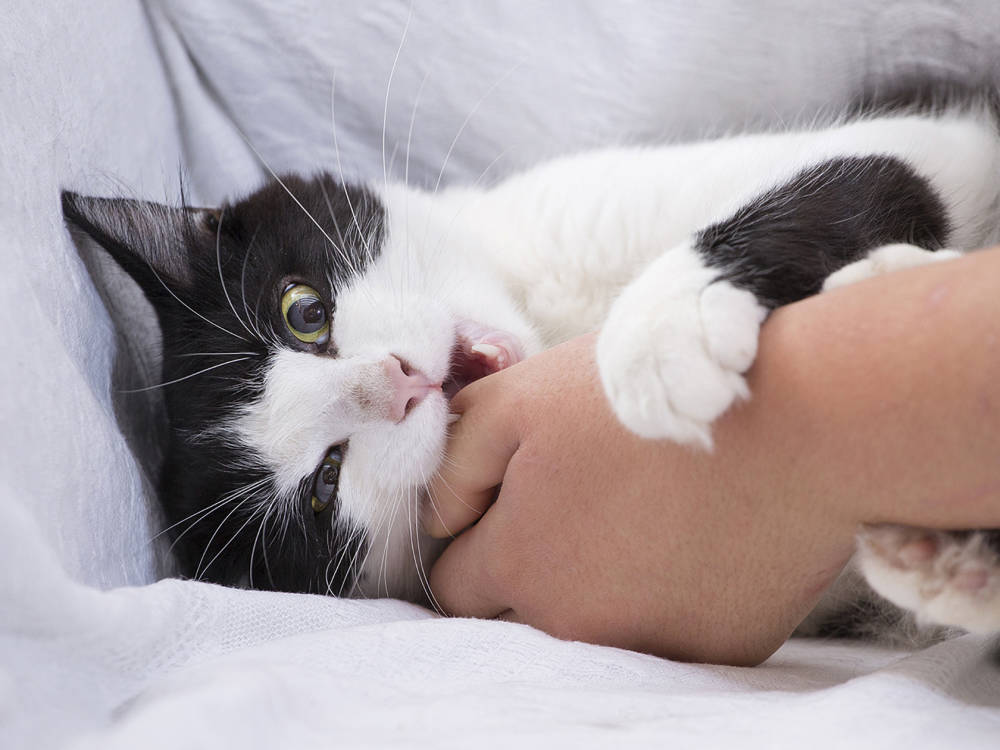
share article
In This Article:
Common Reasons Cats Bite opens in a new tab How to Determine Why Your Cat Bit Youopens in a new tab How to Stop Your Cat From Biting Youopens in a new tab When It’s a Concern opens in a new tab Frequently Asked Questionsopens in a new tab
We’ve all been there — you’re on the couch binge-watching Love Is Blind, stroking the seemingly contented creature in your lap, then “Ouch, what the…did my cat just bite me? We were just vibing seconds ago!”
It’s hard not to take your cat’s treachery personally but — trust us — it’s not you. It’s not uncommon for cats to get overstimulated by over-petting, which can cause a buildup of stress hormones and static electricity. (As a rule, cats tend to prefer being pet around the head and neck; attempt long body strokes at your own risk.) And just like people, cats have affection thresholds, especially rescue kitties that may never have known human touch and can only tolerate so much. Instead of overthinking their mixed messages, read on to understand what unnerved them in the first place.
Common reasons why cats bite
Expressing affection
Cats have unique ways of communicating their feelings, and biting can sometimes be their way of showing love (weird, right?). It might seem a bit counterintuitive, but for some cats, gentle nibbles or soft bites can be a sign of endearmentopens in a new tab. They may do this during moments of petting or cuddling to show their affection, almost like giving you a little love nip. This may be the case if your feline seems particularly relaxed and content — it could just be their way of saying they love you.
Playing or practicing hunting
Cats have a knack for turning everyday interactions into playful adventures, and sometimes, their inner hunter comes out to play in unexpected ways. When your feline friend starts to nibble or gently bite during playtimeopens in a new tab, they’re likely channeling their wild side and imagining you as their elusive prey.
“Cats can also bite when they are feeling especially playful,” says Dr. Mikel Delgado PhD, a certified applied animal behaviorist and cat behavior consultant at Feline Mindsopens in a new tab. “Biting is a natural part of the predatory sequence, but we prefer that cats direct that biting behavior toward toys (or prey) and not toward human hands and ankles. If your cat isn’t getting enough exercise and playtime, they may start treating your body parts like prey. This behavior is described as play aggression.”
Anxiety or overstimulation
When cats feel overwhelmed by their surroundings or anxious about changes in their environment, they might resort to gentle nips or bites as a way to express their discomfort. Similarly, during moments of high excitement or overstimulation, a cat’s natural response might be to use their teeth as a way to communicate that they need a moment to decompress.
“Cats often bite due to overhandling by humans — often, we pet them too much or too roughly,” Dr. Delgado says. “Our fingertips are very sensitive and we love to touch our cats because they are so soft and cute! However, they are a high-frequency, low-intensity contact species, meaning they much prefer very short bouts of gentle petting, rather than an intense love fest.”
Fear or stress
While this is rarely the cause with gentle bites, fear or stress can cause aggressive behavior in cats, including biting.
“Cats also bite when they feel fearful or stressed, and they may go into fight or flight mode,” Dr. Delgado explains. “This can happen when someone tries to capture a cat and get them into a carrier, or when a cat sees another cat outdoors and becomes threatened. These bites can be especially serious.”
If your cat is biting due to fear or stress, you’ll likely notice other body language cues. Your cat may have flattened ears, dilated pupils, a low body posture, or even growl or hiss as a way to communicate their distress.
How to determine why your cat bit you
If you understand the most common reasons why cats bite, then you can usually narrow down why your cat bit you. Reading your cat’s body language and keeping tabs on their health can provide context clues about their nipping behavior.
Read your cat’s body language
Cats use body languageopens in a new tab to communicate how they feel, and chances are your cat gave you some warning signs before biting you — however subtle those signals were.
“We have to remember that our verbal communication is quite different from that of our animal counterparts,” says veterinarian Dr. Caity Flint. “They rely much more on nonverbal cues. When those cues are ignored or misunderstood, the end result may be aggression or sharper warnings.”
So how do you know when your cat has had enough? General restlessness is the first sign that something is wrong. A twitching tailopens in a new tab, flattening of the ears, rippling skin, and a soul-crushing death stare will follow if you don’t take the hint.
Consider your cat’s health
Your cat’s health might also affect how they react to your touch. If they’re elderly, petting can exacerbate arthritic pain. Dental and skin issues might also make your cat cranky and hyper-sensitive to contact. If your cat has previously enjoyed being pet and this is a new behavior, it’s worth taking them to your vet to make sure there isn’t a health concern behind the biting.
“Your vet can help you rule out medical causes and create a plan to try and correct the behavior if necessary,” Dr. Flint says. “If all else fails, your veterinarian may refer you to a board-certified veterinary behaviorist.”
How to stop your cat from biting you
So how do we break the cycle of neverending nipping? If you can clearly identify the trigger for the biting, then you’ll most likely be able to stop the behavior.
“For example, if your cat bites when you pet them in a certain way, then avoid the trigger, stop petting them like that,” Dr. Delgado says. “Sometimes it is that simple.”
Ease up on rough play.
It’s tempting to roughhouse with your little tiger, but if you don’t set boundaries first, play fighting can quickly escalate into aggression, and that behavior can bleed over into other interactions with your cat. “It’s common for many pet parents to utilize their hands, especially with kittens, when playing or roughhousing. This type of play can teach your pet to see your hands as toys or reinforce the idea that the way to receive attention is to play fight,” Dr. Flint says. “It is important from a young age to always use toys and not hands.”
Take your cat’s cue.
With both our hands and our pride wounded, it’s easy to react negatively, but take a beat and think things over. Yelling or physically responding will only justify — to your cat — biting you to begin with. Instead, stop petting your cat and give them time to chill and recalibrate.
“Learn your cat’s likes, dislikes, and triggers,” Dr. Flint suggests. “From there, you can begin to determine what may have caused the aggression and what you can do to avoid it in the future.”
If this is a common occurrence, you can use positive reinforcement to warm them to your touch and strengthen your bond. And the best way to their heart is through their stomach, so pair pets with treats, then slowly but surely increase petting times as they become more comfortable with it.
Provide a distraction.
Look, your cat may just be bored and your hands are the first thing they see, so they go to town in hopes of getting a little bit of entertainment. Try providing them with a more appropriate distraction to see if the biting behavior stops.
“Give your cat plenty of interactive play, exercise, and mental stimulation so they can get some of those biting instincts out in other ways — such as biting toys instead of hands,” Dr. Delgado says.
When cat biting is a concern
If all of your efforts to curb your cat’s mouthy behavior have failed, it might be time to reach out for help. If your cat’s biting breaks skin or increases in frequency or intensity, it’s best to get in touch with the pros to help figure out next steps.
“Cat biting can be a concern if the human being involved is being injured,” Dr. Delgado explains. “Biting can be a sign of stress, so even if you aren’t being injured or don't ‘mind’ that your cat bites you, it can be a sign something is amiss with your cat, especially if it is paired with more serious signs of stress such as hissing, growling, or hiding.”
So, next time you feel a nip from your feline friend, remember, it’s not always personal — sometimes, they’re just communicating in their own unique way. By understanding the reasons behind their bites, you can foster a deeper bond with your cat and navigate your relationship with a bit more insight and understanding.
FAQs (People also ask):
Why does my cat hug my arm and bite me?
When a cat hugs your arm and then proceeds to bite, it might be engaging in a behavior known as “love biting.” Cats may do this as a form of affection or playfulness. It’s their way of expressing fondness, but they might not realize that their bite can be uncomfortable for humans. It’s essential to understand your cat’s body language and set boundaries to prevent any accidental harm.
Are cat bites dangerous?
Cat bites can be dangerous due to the bacteria present in their mouths. While a simple scratch or nip might not cause significant harm, a deep bite can introduce bacteria into the wound, leading to infection. If a cat bite breaks the skin, it’s crucial to clean the wound thoroughly and seek medical attention to prevent complications.
Why does my cat bite me gently while purring?
When a cat bites gently while purring, it’s often a sign of contentment and affection. This behavior is commonly known as “love biting” or “kneading.” Cats may do this when they’re feeling happy and relaxed, and it's their way of showing affection towards their human companions. While it may seem contradictory, the gentle bite is usually meant as a sign of endearment rather than aggression.
What should I do if my cat bites me?
If your cat bites you, it’s essential to react calmly and avoid reacting aggressively, as this can escalate the situation. First, gently remove yourself from the situation to prevent further biting. Wash the affected area with soap and water to clean the wound thoroughly. If the bite is deep or shows signs of infection, such as redness, swelling, or pus, seek medical attention from a healthcare professional. It’s also a good idea to observe your cat's behavior to understand the underlying reason for the bite and address any potential triggers or stressors to prevent future incidents.

Bailey Freeman
Bailey Freeman lives in Nashville, TN, where she works as a freelance writer, editor, content creator, and circus artist. You didn't read that wrong — when she's not writing about the world around her, she works as an aerialist and instructor (in a circus tent and everything). She's also a big fan of travel, the outdoors, and neon hair dye.

Courtney Elliott
Courtney Elliott, a proud Cleveland native living in Manhattan, blends her decade of writing and editing expertise with her unshakable devotion as a pet parent to her French Bulldog, Gus. When she’s not at her desk, you’ll find her frolicking in Central Park or engrossed in a good book at a local coffee shop.
Related articles
![cat hissing under chair]() opens in a new tab
opens in a new tabCat Hissing: Fair Warning or Fighting Words?
Your cat’s hissy fit could mean Don’t test me or Let’s do this. We wouldn’t call their bluff.
![cat staring at person on table]() opens in a new tab
opens in a new tabWhy Does My Cat Stare at Me?
...Is it something you said?
![A woman with curly black hair sitting in front of a dark purple and yellow backdrop while looking down affectionately at her two cats sitting on her lap]() opens in a new tab
opens in a new tabHow to Build Your New Cat’s Trust in You
If your cat still approaches you with a figurative arched eyebrow of skepticism, try these tricks to put them at ease.
![Cat being happily pet in the sunshine of a window]() opens in a new tab
opens in a new tabHow to Pet a Cat (Without a Scratch)
There is a right and wrong way.
![Two cats walking with their tails sticking straight up]() opens in a new tab
opens in a new tabCat Tail Meanings
Cats are enigmas. But their tail movements can reveal a lot about their moods.
![Young woman hugging her cat]() opens in a new tab
opens in a new tabWhy Do Cats Purr?
Surprise: It doesn’t always mean they’re happy.
